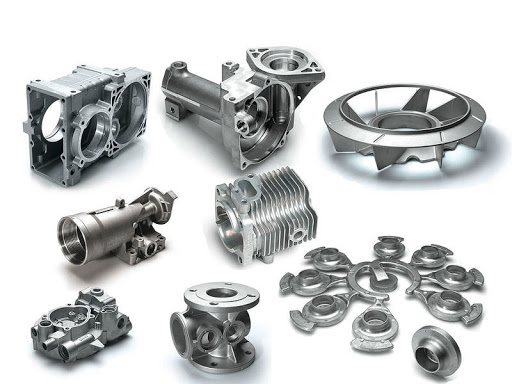How Aluminum Foundry techniques have evolved with innovation
The Important Uses Aluminum Foundry in Different Industries and Their Effect
Aluminum shops act as a necessary source within numerous markets. Their resilient and light-weight materials considerably improve efficiency in automotive, aerospace, building, and electronic devices industries. As each market leverages aluminum's distinct buildings, they additionally add to sustainability initiatives. This diverse influence motivates a deeper exploration of exactly how Aluminum formed these fields. What details technologies and advantages emerge from its usage?
Automotive Industry Applications
The auto sector increasingly depends on Aluminum Foundry applications to enhance vehicle performance and performance. Light weight aluminum's light-weight nature adds greatly to fuel economy, making it a favored selection for producers aiming to reduce emissions and improve total lorry characteristics. Parts such as engine blocks, transmission housings, and wheels are commonly created through Aluminum casting procedures, permitting for detailed layouts that fulfill extensive security and performance requirements.

Aerospace Innovations

The usage of aerospace-grade Aluminum alloys improves resistance to corrosion and exhaustion, important for the demanding atmospheres airplane face. Technologies in additive production also permit rapid prototyping and customization of parts, lowering lead times and expenses.
Building and construction and Framework
While the building and framework markets remain to advance, Aluminum factories are progressively identified for their payments to contemporary structure practices. Aluminum's lightweight nature and high strength make it a perfect product for numerous architectural applications. Shops provide elements such as light beams, frameworks, and facades that improve the resilience and long life of buildings and infrastructure tasks.
Furthermore, light weight aluminum's corrosion resistance plays an essential role in expanding the lifespan of structures exposed to rough ecological conditions. The energy effectiveness of Aluminum items additionally lines up with sustainable building initiatives, adding to reduced energy consumption in building and construction. In addition, ingenious spreading techniques have actually broadened the design possibilities, enabling designers and architects to produce cosmetically pleasing yet useful frameworks.
Electronic devices Manufacturing
Aluminum foundries play a considerable function in the electronic devices manufacturing sector, where the need for thermally conductive and lightweight products is critical. Metal Castings. Elements such as warmth sinks, cases, and brackets are frequently created utilizing Aluminum because of its outstanding thermal residential or commercial properties and ability to dissipate heat effectively. This is essential in electronic gadgets, where overheating can cause failing and minimized performance
The flexibility of Aluminum permits complex designs and exact machining, which are essential in modern-day electronic devices. Furthermore, aluminum's non-magnetic residential properties make it appropriate for applications in sensitive electronic tools, minimizing interference. Aluminum's resistance to corrosion boosts the sturdiness of electronic parts, guaranteeing long life and integrity.
Sustainability and Reusing Efforts
Offered the boosting emphasis on ecological responsibility, the Aluminum Foundry market has great site actually made significant strides in sustainability and recycling initiatives. Aluminum is naturally recyclable, permitting factories to reclaim and reuse product with very little power expense compared to main manufacturing. This closed-loop recycling procedure not just lowers waste but additionally reduces greenhouse gas exhausts, adding to an extra sustainable production model.
Lots of foundries are embracing energy-efficient modern technologies, including sustainable power sources, to power their procedures. This change not just decreases reliance on fossil fuels however likewise improves general functional efficiency
Market partnerships are more promoting sustainable methods, such as sharing ideal techniques and developing ingenious recycling approaches. By focusing on these initiatives, the Aluminum Foundry sector is positioning itself as a leader in sustainable manufacturing, lining up with international targets for sustainability while discover this meeting the demands of different industries.

Regularly Asked Questions
What Are the Key Advantages of Using Aluminum in Foundry Processes?
The key benefits of making use of Aluminum in Foundry processes include its lightweight nature, superb corrosion resistance, high thermal and electrical conductivity, and flexibility, enabling for detailed layouts and reliable recycling, inevitably boosting total manufacturing effectiveness and decreasing expenses. - Wisconsin Aluminum Foundry
Just How Does Aluminum Foundry Impact Item Lifecycle Administration?
Aluminum Foundry greatly enhances product lifecycle management by enabling reliable product use, decreasing waste, and promoting recycling. Its light-weight residential properties improve transportation effectiveness, while toughness extends product life expectancy, ultimately contributing to sustainability and cost-effectiveness in production.
Exist Particular Challenges in Aluminum Foundry Production?
Specific difficulties in Aluminum Foundry manufacturing include managing temperature control, making sure material top quality, lessening waste, and adjusting to changing market needs. These variables can impact performance, price, and total competitiveness within the market.
What Precaution Are Crucial in Aluminum Foundry Procedures?
Important precaution in Aluminum Foundry procedures include personal protective tools, correct air flow, regular tools upkeep, risk interaction, and my link emergency reaction training. Executing these practices guarantees worker safety and security and reduces dangers linked with high-temperature metal handling.
Exactly how Does the Expense of Aluminum Compare to Other Steels in Foundry Use?
The expense of Aluminum is normally reduced than that of metals like copper and titanium, making it a cost-effective option for many Foundry applications. This affordability contributes to its extensive usage throughout numerous sectors.
Aluminum shops offer as a necessary source within many sectors. The automotive industry progressively depends on Aluminum Foundry applications to improve vehicle efficiency and effectiveness. The material's recyclability also straightens with the industry's press in the direction of sustainability, as recycled Aluminum needs significantly less power to process contrasted to key aluminum. Aluminum factories play a significant role in the electronics making sector, where the need for lightweight and thermally conductive materials is paramount. Offered the boosting focus on ecological duty, the Aluminum Foundry sector has actually made considerable strides in sustainability and recycling initiatives.